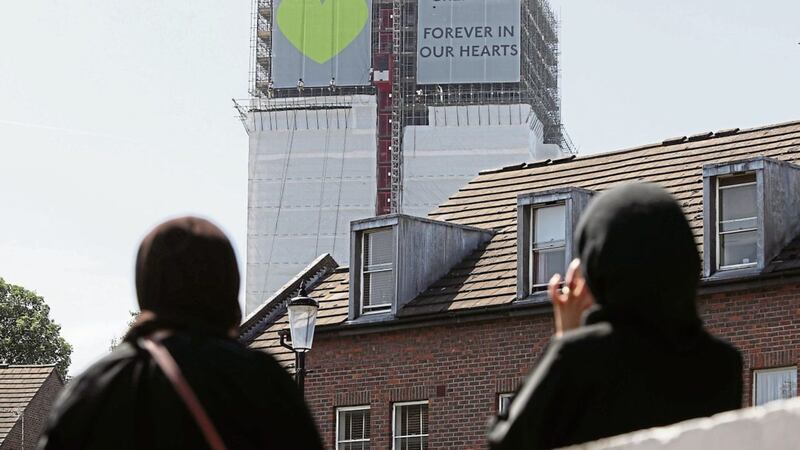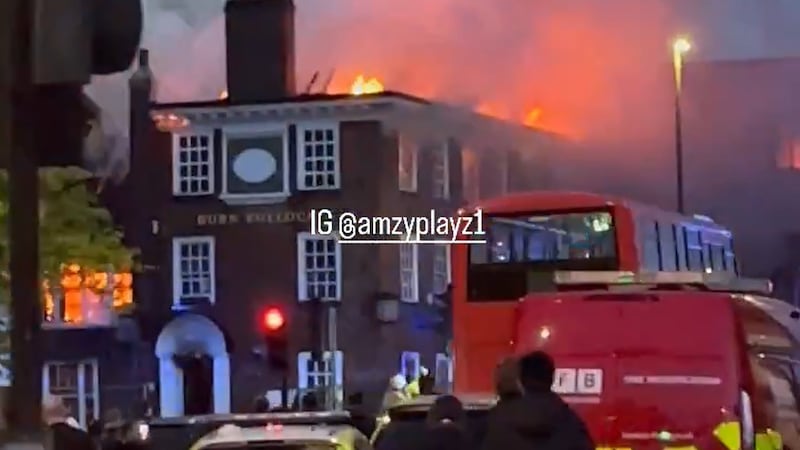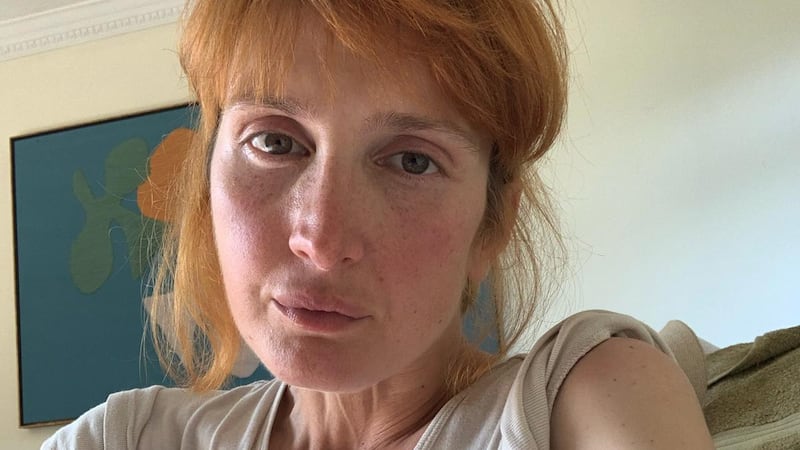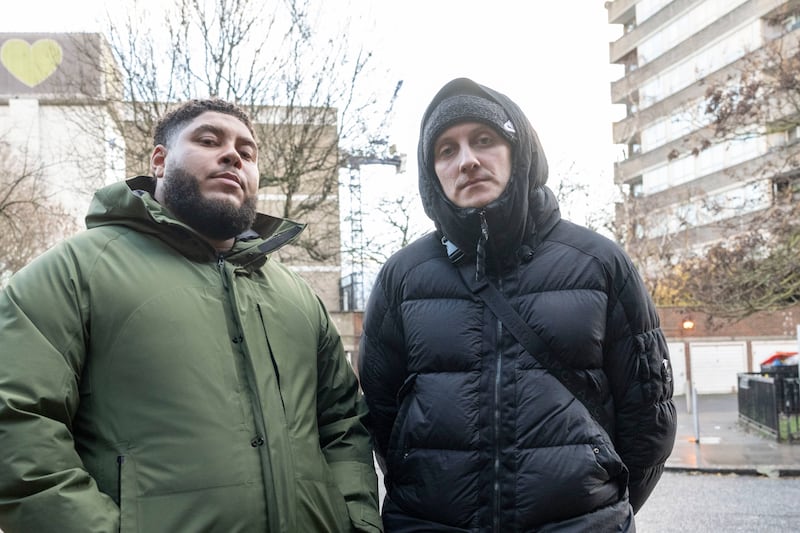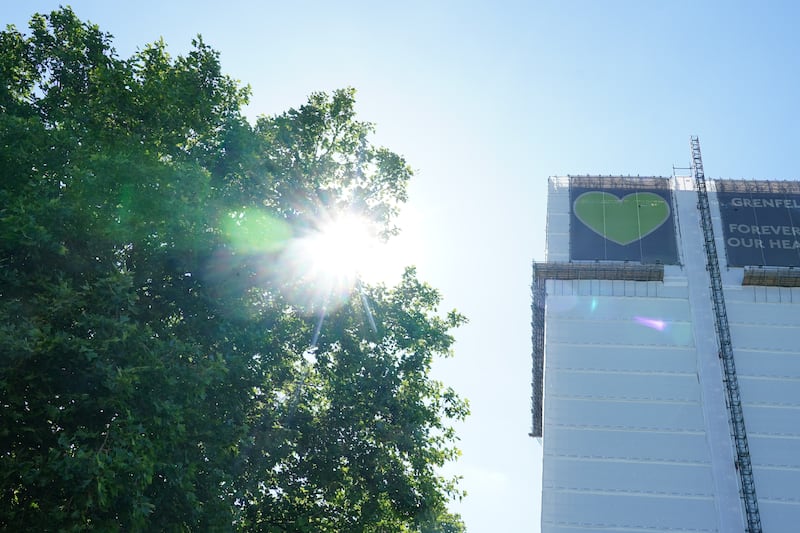THE lawyer representing Behailu Kebede, the occupant of the fourth-floor flat in which the Grenfell Tower fire started, has hit out at the "garbage" that has been written about him.
Rajiv Menon QC said his client had been suffering from increasing feelings of stress and trauma as a result of lies that were spread about him after the tragedy, on top of trying to allay the feelings of guilt he had about the fire.
The aftermath of the fire has affected him so negatively that he feels "terrified" about the prospect of giving oral evidence to this inquiry, Mr Menon said.
He emphatically denied claims that Mr Kebede had packed a suitcase and fled the building.
Instead, he acted "quickly and instinctively", waking his flatmates and calling 999, but only got through to an operator after several attempts.
Mr Menon told the hearing: "He then banged on the doors of the five other flats on the fourth floor. He waited until somebody opened each door and again shouted 'Fire! Fire! Fire!'.
"Having warned all his neighbours on the fourth floor, Mr Kebede returned to flat 16, switched off the main electricity in the hallway and put on some trousers.
"He left his home for the very last time, shutting the front door behind him.
"All he had on his person were the clothes he was wearing and the mobile phone with which he was calling 999."
Mr Menon said Mr Kebede fled his flat barefoot without his wallet, flat keys and car keys.
"He did not pack a suitcase and leave after raising the alarm, a nasty lie printed in the days after the fire and sadly continues to be peddled nearly a year later, most recently in a lengthy article called The Tower, published in the 7th June 18 issue of the London Review of Books," he said.
"In short, Behailu Kebede did exactly what Grenfell Tower residents who discovered a fire in their flat were told to do by the fire action notice posted by the lifts."
Mr Menon said his client had been subjected to a campaign "that can only be described as a campaign of harassment" by the media.
He begged journalists, who he said had repeatedly doorstepped Mr Kebede, to "leave him alone" so he can begin to rebuild his life.
The fourth-floor resident received a call from the police the following day and immediately assisted their inquiries.
Mr Menon said: "He had the most frightening, traumatic and shocking experience of his life. He didn't hesitate."
He continued: "It is important to stand against all the garbage that has been written...Mr Kebede is a significant witness in the police investigation, not a criminal suspect."
Mr Menon said: "The calamitous events at Grenfell Tower and the subsequent media intrusion have had very serious consequences for Mr Kebede and his family.
"His parents and children feel unsafe in his home and were forced to move out.
"The police were so concerned about Mr Kebede's safety that they suggested witness protection."
He has also suffered repercussions to his health - which were not outlined - but was said to be "terrified" at the prospect of giving evidence.
Leslie Thomas QC, who represents a group of the bereaved and survivors, said it was "incontrovertible" that the tower was made less safe by the introduction of flammable material on its outside.
He said one of his clients had told him the refurbishment "changed the building from being an ugly, safe council block to a death trap that looked like a pretty private block".
"The state palpably failed in its primary duty to protect its citizens, and, as for the corporates ... silence speaks a thousand words."
Turning his attention to the Hotpoint fridge-freezer – where it was first thought the fire broke out – Mr Menon said there had been no prior issues.
He then set out seven points:
- Mr Kebede bought the fridge-freezer "brand new" more than five years before the fire.
- Other than when it needed defrosting, it "never caused him problems".
- The tenant "never had to get it repaired by anyone" nor did he try to do so himself.
- Speculation the fridge-freezer had been tampered with was "palpable nonsense".
- Whatever the cause or origin of the fire, it happened "accidentally and Mr Kebede bears no responsibility, directly or indirectly, for the fire, its spread or the dreadful consequences that followed".
- If the fire did begin in the fridge-freezer, this is "not uncommon".
- Research has shown that many popular fridge-freezer brands are more dangerous than realised.
Appealing directly to the inquiry chairman Sir Martin Moore-Bick, he said: "On a more personal note, Sir, Mr Kebede hopes that having heard all the evidence the inquiry will make a clear and unequivocal statement that Mr Kebede as absolutely blameless for the outbreak of the fire, its spread and its fatal consequences.
"This is vitally important. If the inquiry does not explicitly exonerate Mr Kebede, all these sleazy accusations and hurtful innuendo, all the racist assumptions and ignorance that currently prevail will continue unabated.
"The inquiry needs to set the record straight. The inquiry needs to change the narrative about Behailu Kebede. The inquiry needs to thank Mr Kebede for his prompt effort that he made on the night to contact the fire brigade, raise the alarm and warn his neighbours.
"Sitting on the fence in respect of Mr Kebede, with the greatest respect, will not do."
Those responsible for the refurbishment should "hang their heads in collective shame", Leslie Thomas QC said.
He added: "Any attempt to mislead, distract, rewrite history or blame others in an attempt to conceal the truth will be met with unwavering resistance."
Mr Thomas said the state had "permitted a culture of corporate impunity to take root".
Addressing the chairman, he said: "Whilst the extinction of this culture is beyond the powers of any person or any judge, you and your team can surely contribute to its dismantling by joining us in ensuring that by holding those responsible for this terrible fire, this inquiry marks the beginning of the end."
Sir Martin was forced to admonish several people who yelled their approval and then applauded Mr Kebede's lawyer as he spoke on the issue of racial discrimination.
Mr Menon had been supporting calls for the inquiry to consider whether racial or class discrimination played a role in the disaster when he was interrupted.
Sir Martin said: "This is the first occasion that someone has thought it right to try and interrupt proceedings.
"These proceedings have been conducted with a great deal of dignity and sensitivity and I expect it to continue in that way.
"I'm not willing to tolerate shouting, calling out or anything else from those in the room."
Despite this, Mr Menon was applauded at the close of his address, prompting Sir Martin to again urge the need for formality.
Mr Thomas said the idea that Grenfell Tower residents deserved less because they lived in social housing "simply needs to be debunked".
He said negative perceptions of social housing tenants was "all based on false stereotypes and stigmatisation".
He said: "This inquiry is, of course, not only a legal process but a social and cultural event, whether or not that fact is fully embraced by this inquiry.
"It is imperative that this inquiry does not even inadvertently confirm the stereotypes around social housing, even when expressing sympathy with the victims of the fire.
"They were not helpless, they were just not helped."
Michael Mansfield QC, representing survivors and the bereaved, urged Sir Martin to make recommendations by the summer, instead of waiting to include it in a report.
The original target for the interim report was Easter, he said, but "that is gone by and we haven't even started evidence".
Mr Mansfield told the hearing that the public "don't have to wait for recommendations that are obvious", and "if it takes the usual course, the question of recommendations might not arise in part one" of the inquiry.
"If you are prepared to consider recommendations at a much earlier stage that in itself will encourage those who remain silent in relation to these events," he said to Sir Martin.
"For example, it might be possible by the summer for you to begin to indicate or actually make recommendations."
Referring to another major disaster which he had worked on, Mr Mansfield said: "In the case of Hillsborough, Lord Justice Taylor held a public inquiry within a month or so... one of the things he did was a sea-change in the way in which crowd safety was approached.
"The whole thing was transformed by the beginning of the next season that was only months away."
Mr Mansfield set out three areas upon which Sir Martin could make early recommendations.
The first was a "paradigm shift in the mindset and approach to home safety" in the construction trade.
He said: "There should be a right to home safety and security. It cannot be more basic than that."
The second was to identify safety measures that could be introduced on building materials, while the third was a reappraisal of the "stay put" fire safety advice to residents in high-rise blocks.
Reflecting on the story of Mr Kebede in the morning, Mr Mansfield said: "Had each flat or each floor been endowed with a fire extinguisher - what's so wrong with that? What is so expensive about that as another means?"
He added torches, smoke detectors and a public address system could also have been vital safety additions inside Grenfell Tower.
Mr Mansfield made the case for a set of simple fire safety measures that could "shape the world of safety".
He suggested high rise packs for people in flats above a certain floor level, which could include a mask to help minimise smoke inhalation and a torch to aid people's escape.
Having hose reels at the side of tower blocks ready to be plugged into wet risers could also help, he said.
Automated fire alarms, smoke detectors and ventilation systems operating on each floor, not just the one on which the fire was located, were also raised by the QC.
"Instead of which what did we have? Mobile phones, knocking on doors, ringing call centres, total chaos," he said.
He added: "These are all matters that, of course, of themselves do not provide a panacea. It does provide, as it were, incremental resolution to the problem".
James Maxwell-Scott QC, for the Royal Borough of Kensington and Chelsea, opened the inquiry's afternoon session.
He said the fire was a human tragedy but also a man-made one.
He said that he and his team, council leader Elizabeth Campbell and her deputy Kim Taylor-Smith, had attended the seven days of commemorations that preceded the evidence hearings.
He said: "The intensity of emotion that we experienced will ensure that we do not forget the human face of the disaster and the importance of searching for the truth and providing justice for the bereaved, survivors and residents.
"That emotion and passion must energise and sustain this inquiry's desire to search for the truth.
"The search itself must be dispassionate."
Mr Maxwell-Scott said the terms of reference for the inquiry would allow "lessons to be learnt on a national scale as well as a local level".
He suggested building regulations could be one area where particular lessons could be drawn.
RBKC, as the owner of the tower in which social tenants died, understands why it has been the target of such anger, he continued.
"The council recognises that it is seen as the public face of the disaster and understands why it is so. The council is very sorry that its residents suffered in Grenfell Tower."
The narrative in the "mainstream" media and social media has noted the facts that the borough had a lot of wealth and has long been run by one party, he continued.
"The unspoken and at times spoken assumption has been that these facts are somehow relevant because of the fire."
He added: "Mr Chairman, as the evidence unfolds over the coming months, I invite yourself to ask the question - was there something unique about the Royal Borough of Kensington and Chelsea that meant that this terrible fire could only happen there, or is this something that could happen in any borough that has high-rise buildings with external cladding?"
Mr Maxwell-Scott then suggested there was "nothing unique about the Royal Borough of Kensington and Chelsea" which made the fire inevitable.
He said the council was not a "relevant organisation" in the refurbishment - the Tenant Management Organisation (TMO) entered a contract with Rydon as a client.
This was not to "suggest the council played no role at all", he said, but urged Sir Martin to assess the authority in regards to its "specific relevant functions".
Mr Maxwell-Scott outlined how RBKC's cabinet considered the refurbishment proposals on three separate occasions over two years, increasing the budget from £6 million to £10.3 million.
"Those are of the decisions of a council determined to build on the cheap," he added.
He went on: "Given the huge political and media interest in the refurbishment since the fire, it may seem remarkable that it didn't attract more cabinet interest at the time. But may I suggest that there are good reasons why this is so.
"The programme was not a politically controversial or politically high-profile issue. It did not involve cutting services or closing a much-loved community asset.
"At its core it involved a proposal to spend more than £10 million improving the accommodation of social housing tenants.
"As such it had, if anything, the potential to unite those of different political persuasions rather than divide them."
Mr Maxwell-Scott spoke about the role of the local authority's Building Control team.
He said: "The officials who work in Building Control and grant Building Control approvals are not, and do not become, 'designers' of the projects that they approve.
"It is well understood in the construction industry that the fact that local authorities have a Building Control function does not remove the duties on those paid to design buildings."
James Ageros QC, representing the TMO, played down the role the firm had in deciding details of material used in the refurbishment.
He told the hearing: "While the TMO is a specialist in management of social housing stock, it is not a specialist in design and construction and had no expertise in this area.
"The TMO's role in relation to the refurbishment project was that of a client."
"The TMO doesn't seek to underplay the importance of its role," he said, but added that regulations say "clients may not be specialists in design and construction so clients are not required to plan, manage or carry out" these areas.
The council had put forward certain companies to work on the project including Studio E Architects, the TMO's lawyer said.
Rydon was selected as the main contractor after a rendering process as they had the "highest quality and offered the best value for money".
"The cladding that was eventually used on Grenfell Tower was shown to RBKC planning on numerous occasions in 2014 and in fact there was a mock-up installeB?F?RF?W"?G6V???R6?B??R???f?&R'&?vFR?Bv?F?F?RD??&??VV??&6?2??&VB527F?22f?&R6fWG?6?7V???F?R?V&??v2F?B??"vW&?6?B6???2?FR'?FV??2v??f??'B?F?R??V?'??R6?C?%D?&V6??W2F?B?R?F?R?77VW2F?R??V?'?v???fRF?6?6?FW"?2v?B6???2vW&R?FR'?&W6?FV?2F?v???v?V??v?BF?W?vW&R&?B?$??D?FV?v?F?F?W6R6???2v??&R6?6?FW&VBGW&??F?2??V?'??F?RD?v??6?F??RF?&?FR?????F????&V?F??F?F??R6???2?vRgV?&V6?FRF?B?Bw2???F??77VR??7FW?V????2?&W&W6V??&6?2?&W7?FVBF?67W6F??2?&6??FR6???R"&V???V?'?6??2???fVB??F?R&VgW&&?6????w&V?V??F?R6??7W?VBF?R6?FF????F?BW?W'G26?6?G&?'WFVBF?F?R?7B&?B?F?RW?FW&??f?&R7&VB?R6?C?$6???22F?F?R?6??FWF???w&?GFV??V?w26?&?F??B?F?W26??RvRf??VBWfW'?7V&R???F?RvW2??FVBF?W2???F?R????????6?C?%F?W?6?6?7FVB?Gv?6?VWG2?????v?F??WF???6?R?%F?R6?R?G6V?v2?f??6?6?'W7F?&??%F?R??f7GW&R?7W??F?W6R??v2F?R??'Bv?6?F?R6???VB??F?RWfV?2?F??WF?F?Rf?&R??RFFVC?%F?R7W??F?R???G6V?v2?V?&V??vgV??'????V????6?&7V?F?R???????6?C?$?Bw2???F?F?7G&W72F?B??F??R&WV?&??F?R7W??7V6???&R??&?&????fVB&?W76?????F?R6?7G'V7F???&VgW&&?6????'V???2???B?2F?W?v??FV6?FRv?WF?W"F?7V?&RF?R?????v?BV?F?W2?$?B?2F?W?v??FV6?FRv?WF?W"F?W6RF?R??f?'F?7V?"&?7B??F?W?&RF?&Rf'&?6FVB???F?W?&RF?&Rff?VB?B?2F?W?v??FV6?FR?v?WF?W"??6?&??F??v?F??W"6??V?2?F?R'V????F?R??6?&R&?&?FV??6fV?W6VB?$???'F?7V?"?B?2F?W?v??FV6?FRF?R6?&??F????FW&??6?&?6??F?R6?FF??7?7FV? ??GVW6F??7FW??&'v?6R27?&?B?R?&6?2w2F?7G&?'WF?2?F?ffW&V?&?V7B?&W??GV??R6?BF?W?vW&R&?V?&VfW'&??F?F?R&W??&?B&?V7BW6VB?w&V?V?2WG&????FW"F?GfW'F?6R26fRF?R&W??GV?&?V7B6?BF?&R??6?'W7F?&?"?6?RF?BF?R??V?'?$&6?2&R??F?6R?F?2GfW'F?6???vR6??v?BF?V"v?WF?W"F?W?F?6f??B?'WB?bF?W?F??B?vRv??6?f?F?RGfW'BF?&RF?GFVB????V?'?Wf?FV?R??v?F??&?&?FRv&?r?6?F?Bv?B?2F?7G&W76???F?7F7FVgV??V6R??&?WF??&R6???W?F?R67&VV???"??????&W7?6RF?F?R6???2?6?C?%F?R6??B???v?FvR?????v?WF??6VBF?R??vW26????67&VV?6??2&VfW'&VBF?W7FW&F??v??7G&?v?F?6&?R?F?V?"6?FV??%F?W6R??vW2vW&R?B6VV??7&VFVB'?7W7F?W"?v??2&VV??gB???F?'BF?BvRv???FW?&R?G26?GV7B??
